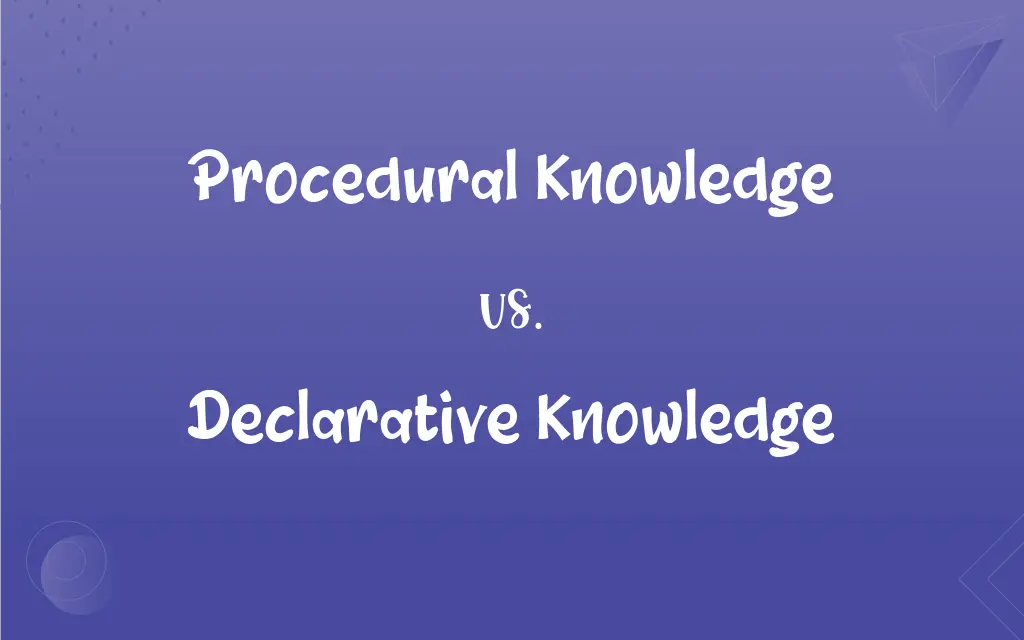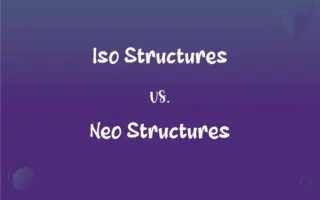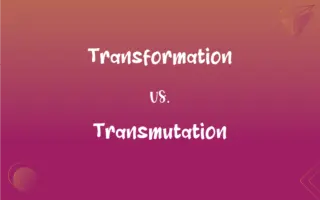Procedural Knowledge vs. Declarative Knowledge: What's the Difference?
Edited by Aimie Carlson || By Harlon Moss || Published on February 14, 2024
Procedural knowledge is knowing how to perform tasks (e.g., riding a bike), while declarative knowledge involves knowing facts or information (e.g., the capital of France).

Key Differences
Procedural knowledge refers to the understanding of how to perform various tasks, actions, or processes. It involves skills and methods and is often acquired through practice and experience. On the other hand, declarative knowledge is about facts and information. It consists of knowing 'what' rather than 'how', and is typically expressed in descriptive language.
Procedural knowledge is often unconscious and hard to verbalize, as it involves learned skills that become automatic, like swimming or driving. Declarative knowledge, conversely, is easy to communicate and share with others as it encompasses facts and data, like historical dates or scientific facts.
In education, procedural knowledge is developed through practical exercises and repetition, such as learning to solve math problems. Declarative knowledge is usually acquired through reading, lectures, or discussion, involving the retention of factual information.
The application of procedural knowledge is seen in performing tasks without conscious thought, like playing a musical instrument. Declarative knowledge is used when recalling specific information, such as names of countries, languages spoken, or scientific principles.
The assessment of procedural knowledge is typically through performance-based tasks, while declarative knowledge is assessed through quizzes or tests that require recall of facts and information.
ADVERTISEMENT
Comparison Chart
Type of Knowledge
How to perform tasks and actions
Facts and information
Acquisition
Through practice and experience
Through reading and learning
Expression
Often unconscious and hard to verbalize
Easily communicated and shared
Examples
Riding a bike, playing an instrument
Capital of a country, historical dates
Assessment
Performance-based tasks
Quizzes and tests requiring recall
ADVERTISEMENT
Procedural Knowledge and Declarative Knowledge Definitions
Procedural Knowledge
Involves motor skills and methodologies.
His procedural knowledge of carpentry allowed him to build a chair without instructions.
Declarative Knowledge
Acquired through reading and learning.
Her declarative knowledge about space came from extensive reading.
Procedural Knowledge
Often tacit and difficult to articulate.
Despite his procedural knowledge of piano playing, he found it hard to teach others.
Declarative Knowledge
Easily articulated and communicated.
He shared his declarative knowledge of history during the lecture.
Procedural Knowledge
Knowledge of how to perform tasks and actions.
His procedural knowledge of cooking was evident in his effortless preparation of the meal.
Declarative Knowledge
Encompasses theoretical understanding.
Her declarative knowledge of economics theories was vast.
Procedural Knowledge
Skills developed through practice and experience.
Her procedural knowledge in driving made navigating the busy streets seem easy.
Declarative Knowledge
Knowledge of facts and information.
Her declarative knowledge of world capitals impressed everyone.
Procedural Knowledge
Learned through doing and repetition.
Through repeated practice, her procedural knowledge of programming improved.
Declarative Knowledge
Involves remembering and recalling information.
His declarative knowledge of chemical formulas helped him in the exam.
FAQs
What is procedural knowledge?
Knowledge about how to perform tasks and actions.
Can procedural knowledge be easily verbalized?
It's often difficult to verbalize as it's more about action than words.
What is declarative knowledge?
Knowledge that consists of facts and information.
How is procedural knowledge acquired?
Through practice, experience, and doing.
How is declarative knowledge acquired?
Through reading, learning, and memorizing.
Where is declarative knowledge commonly used?
In academic settings or when recalling specific facts.
Can procedural knowledge change over time?
Yes, as one gains experience and skill.
Is declarative knowledge static?
Yes, it generally involves static facts and data.
Do experts have high procedural knowledge?
Generally, yes, especially in their field of expertise.
How do you assess procedural knowledge?
Through performance-based tasks and demonstrations.
How do you assess declarative knowledge?
Through tests and quizzes requiring factual recall.
Is declarative knowledge easy to share?
Yes, it can be easily communicated and shared.
Where is procedural knowledge commonly used?
In tasks requiring motor skills, like driving or cooking.
Can procedural knowledge become automatic?
Yes, it often becomes second nature through practice.
Is procedural knowledge more about 'how'?
Yes, it focuses on methodologies and processes.
Is memorization important for declarative knowledge?
Yes, as it involves recalling specific information.
Can declarative knowledge change over time?
It can, with the acquisition of new information.
Is declarative knowledge more about 'what'?
Yes, it's about knowing specific facts and theories.
Can procedural knowledge be learned from a book?
It's best learned through practice, not just reading.
Do students primarily use declarative knowledge?
Often, especially in early learning stages.
About Author
Written by
Harlon MossHarlon is a seasoned quality moderator and accomplished content writer for Difference Wiki. An alumnus of the prestigious University of California, he earned his degree in Computer Science. Leveraging his academic background, Harlon brings a meticulous and informed perspective to his work, ensuring content accuracy and excellence.
Edited by
Aimie CarlsonAimie Carlson, holding a master's degree in English literature, is a fervent English language enthusiast. She lends her writing talents to Difference Wiki, a prominent website that specializes in comparisons, offering readers insightful analyses that both captivate and inform.







































































